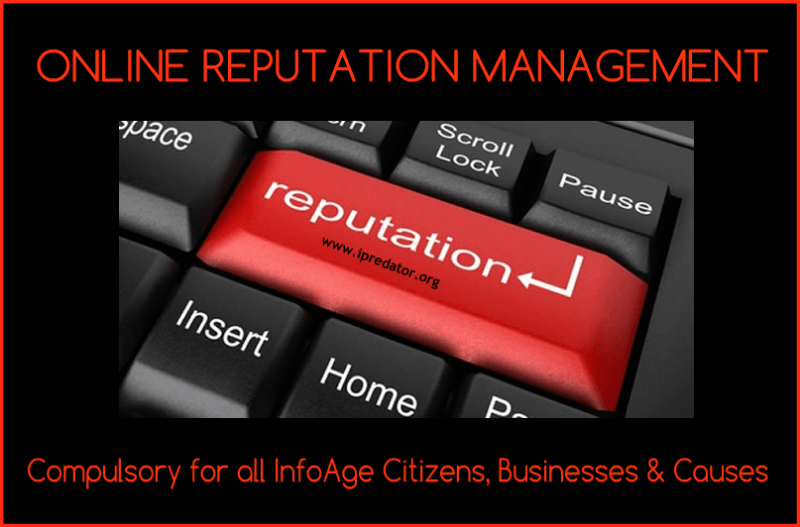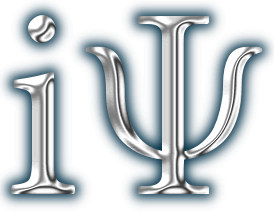Digital Reputation Tips for Business
Online Reputation Management
Digital Reputation Business Tips: Below are 20 Digital Reputation Tips for Business included in the Digital Reputation Protection Checklist offered here free to download. Given the rapid growth of information technology, E-commerce, M-commerce and the importance of digital reputation, all organizations must now allocate a portion of their operating budget and energy to insulate their business from corporate disparagement, Internet defamation, Internet libel, disgruntled past employees and nefarious corporate competitors.
Digital Reputation: Digital reputation is a term used to describe the reputation of an Information and Communications Technology (ICT) user or business that is disseminated online and available to peers, superiors, loved ones and consumers. This information can be positive or negative and vital to the health, success and reputation of an ICT user or business.
Digital reputation is created and sustained by peers, school or work associates, loved ones, acquaintances, consumers, competitors, adversaries, online strangers and iPredators. Given the widespread growth and expansion of ICT, a positive digital reputation is vital to people, communities and businesses to thrive, survive and for attainment of personal endeavors.
Digital reputation and the growing risks confronting ICT users and businesses have become increasingly endemic due to the escalating use and significance of the Internet as a communication platform. With the ascent of social media, the formation of Digital reputation is an increasingly common process and the practices of Digital Reputation Management has become crucial for both individuals and corporate entities.
An ICT user or business’s Digital reputation is directly correlated to their Digital Footprint. Like digital footprint, an ICT user’s Digital Reputation is directly correlated to the quantity, quality, accuracy and extent of personal information they post or share online available and used by other ICT users.
If it is not already being done within your business, it is highly recommended to address your organizational weaknesses in relationship to corporate disparagement, digital reputation management strategies, employee, consultant and competitor social media usage and the growing concern by all organizations of their reputation being tarnished by Information and Communications Technology.
Digital Reputation Protection Checklist
Digital Reputation Protection Checklist (DRPC): The Digital Reputation Protection Checklist (DRPC) is a 100-item checklist designed for an ICT user and/or their business to monitor, protect and manage their digital reputation. Digital Reputation is a term used to describe the reputation of an ICT user or a business that is disseminated online and created and sustained by peers, school or work associates, loved ones, acquaintances, consumers, competitors, adversaries, online strangers and iPredators.
This information can be positive or negative and vital to the success, growth and health of an ICT user or business. The DRPC is a data collection tool that investigates a business’s vulnerability of being targeted, disparaged, slandered, stolen from or infiltrated by cyber criminals, disgruntled past employees/customers or nefarious corporate competitors.
The DRPC focuses on the ICT user and the business’s cyber-security breach potential, digital reputation acumen and capacity to successfully institute online reputation prevention and protection strategies. With the rapid growth and expansion of information and communications technology, all businesses are now required to allocate a portion of their operating budget and marketing efforts to both cyber security and digital reputation management. It is recommended to complete the DRPC on a quarterly basis and more frequently if corporate competitors or adversarial entities are suspected of engaging in online competitor disparagement.

InfoAge Online Reputation
As Information and Communications Technology (ICT) becomes more widespread, cyber-attack prevention, education and protection are areas requiring immediate attention. The Information Age has many benefits to humanity, but it is vital to identify and prevent the malevolent and nefarious elements that exist in cyberspace and Information and Communications Technology. The definition of Information and Communications Technology (ICT) is as follows:
ICT: Information and Communications Technology (ICT) is an umbrella term used to define any electronic or digital communication device or application used to obtain, exchange or disseminate information. ICT stresses the role of unified communications and the integration of telecommunications, which enable users to create, access, store, transmit, and manipulate information. ICT consists of all forms of telecommunication, information technology, broadcast media, audio and video processing, transmission and network-based control and monitoring functions.
Information and Communications Technology means computer-based management of data or ideas but will continue to grow with technological advancements. ICT has rapidly become one of the basic building blocks of modern society and will become increasingly integral as the information age matures.
Many countries now regard understanding ICT and mastering the basic skills and concepts of ICT as part of the core of education, alongside reading, writing and mathematics. The importance of ICT to humanity lies upon a continuum of relevance ranging from minimal impact to vital requirement regarding an ICT user’s day-to-day activities. For some, ICT and the Internet are nothing more than tools of convenience for conducting their responsibilities. For others, their social, scholastic, business and/or financial affairs disclosed online are crucial to their self-esteem, self-worth, success and perceptual world.

Digital Reputation Business Tips
The twenty tips provided can be a first step in your endeavor to establish an organization prepared to minimize the damages if your corporate reputation is attacked and reduce the potential of having your business placed in jeopardy due to Information and Communications Technology (ICT.) Although cybercrime, identity theft, cyber theft and online corporate disparagement require ICT, it is vital to always address the issues involving the people related to your business who use ICT to conduct business and their private affairs.
Note: The term “business” in the tips below represents any of the following: owner(s), employees, business consultants or the business itself as an entity.

1. You, a consultant or assigned employee(s) consistently monitor and manage the ICT user or business’s digital reputation.
2. You, a consultant or assigned employee(s) set screensaver passwords to lock ICT systems when not in use.
3. You, a consultant or assigned employee(s) set security settings to stealth mode, use at least one firewall and limit downloads to essential items from reputable sources.
4. You, a consultant or assigned employee(s) manage your browser settings and dump cookie and search history caches regularly.
5. You, a consultant or assigned employee(s) monitors and ensures sensitive information does not belong to mobile devices or computers that hooks up to the Internet.
6. You, a consultant or assigned employee(s) monitors and ensures that sensitive personal information is never available on a work or employer’s machine.
7. You, a consultant or assigned employee(s) has set up free e-mail accounts to protect yourself or your business from being impersonated.
8. You, a consultant or assigned employee(s) have segmented your personal life from your work or career persona as a reputation damage control measure.
9. You, a consultant or assigned employee(s) have set up a minimum of 4 free e-mail accounts for your friends/family, financial issues, business contacts and whenever anyone not in the priority categories asks for an e-mail address.
10. Each email for you, your loved ones or business has a diverse set of passwords and security questions.
11. You, a consultant or assigned employee(s) have segmented your personal life from your work or career persona from your social media persona (i.e. Facebook, LinkedIn, Twitter).
12. You, a consultant or assigned employee(s) consistently update, monitor and manage your blog or website.
13. You, a consultant or assigned employee(s) consistently make sure to link to reputable sources and create content on a regular basis.
14. You, a consultant or assigned employee(s) consistently post on related sites in yours and/or the business’s field.
15. You, a consultant or assigned employee(s) are familiar with Search Engine Optimization, Search Engine Marketing & Social Media Optimization to ensure posted material from your blog or website ranks high in search engines.
16. You, a consultant or assigned employee(s) have a prepared and ready reputation damage intervention plan.
17. You, a consultant or assigned employee(s) have researched, aggregated and created reputation management strategies for all potential information damaging scenarios.
18. You, a consultant or assigned employee(s) regularly conducts scheduled Advanced Google Search and have set up Google Alerts with the name of the ICT user or the business.
19. You, a consultant or assigned employee(s) regularly conduct scheduled searches of message boards.
20. You, a consultant or assigned employee(s) regularly conduct scheduled searches of social media and social networking sites.
Michael Nuccitelli, Psy.D.
Michael Nuccitelli, Psy.D. is a NYS licensed psychologist, cyberpsychology researcher and online safety educator. In 2009, Dr. Nuccitelli finalized his dark side of cyberspace concept called iPredator. Since 2010, he has advised those seeking information about cyberbullying, cyberstalking, cybercriminal minds, internet addiction and his Dark Psychology concept. By day Dr. Nuccitelli is a practicing psychologist, clinical supervisor and owner of MN Psychological Services, PLLC. After work and on the weekends, he volunteers helping online users who have been cyber-attacked. Dr. Nuccitelli’s is always available to interested parties and the media at no cost. This website and everything created by Dr. Nuccitelli is educational, free and public domain.

